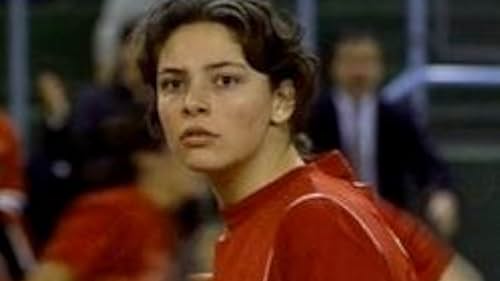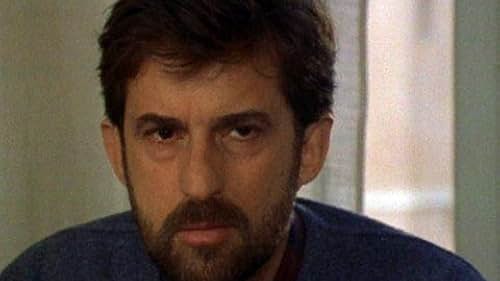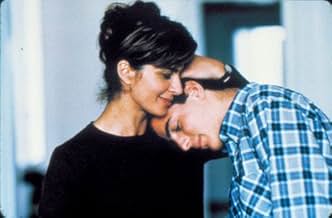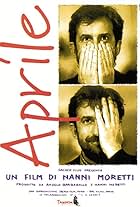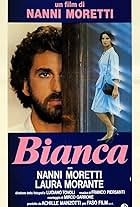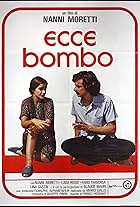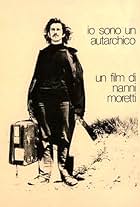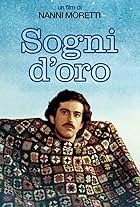Giovanni Sermonti è uno psicanalista e vive con la moglie Paola e due figli adolescenti. Un giorno Andrea, il figlio maggiore, muore a causa di un incidente. Comincia così il lungo travaglio... Leggi tuttoGiovanni Sermonti è uno psicanalista e vive con la moglie Paola e due figli adolescenti. Un giorno Andrea, il figlio maggiore, muore a causa di un incidente. Comincia così il lungo travaglio della famiglia, l'elaborazione del lutto.Giovanni Sermonti è uno psicanalista e vive con la moglie Paola e due figli adolescenti. Un giorno Andrea, il figlio maggiore, muore a causa di un incidente. Comincia così il lungo travaglio della famiglia, l'elaborazione del lutto.
- Premi
- 16 vittorie e 28 candidature
Trama
Lo sapevi?
- QuizAs of 2015, this is the last film directed by Nanni Moretti where he also plays the main character. All his subsequent appearances in his own films are either supporting roles or extended cameos.
- Citazioni
Essay: You will easily comprehend. Everything will be enlightened, night will no longer blind your path, nature will fulfill you and every mystery shall be resolved.
- Colonne sonoreBy This River
Written by Brian Eno (as B.Eno), Hans-Joachim Roedelius (as Roedelius) & Dieter Moebius (as Moebius)
Performed by Brian Eno
Ed. Musicali BMG Ricordi
Virgin
"The Son's Room" ("La stanza del figlio"), in a way, is really two stories.
The first, rather humorous one, more typical of director/writer/star Nanni Moretti's previous work, concerns a somewhat ineffectual Italian psychiatrist, played by Moretti himself. `Italian' and `psychiatrist' sounds like a funny combination to start with. Giovanni, the analyst (Moretti) has a passive Freudian professional persona that sets him up for criticism and even abuse by his egocentric patients. This gently satirical situation underlines the idleness of middleclass people enmeshed in their mostly self-created `problems.' The second story is the much sadder one of how the psychiatrist's little family (Giovanni; Laura Morante as Paula, his wife; and Jasmine Trinca as Irene, their daughter) lose their beautiful young son and brother Andrea (Giuseppe Sanfelice, of Gabriele Muccino's "Io come te nessuno mai") in a tragic accident, and must come to terms with their irreparable loss. Both stories are sketched in briefly, the family idealized, the patients' personalities reduced to types. What surprises is that Moretti's movie achieves real emotional authenticity precisely because if its light Italian touch.
The two threads intertwine when Andrea's sudden death leads Moretti's character to realize his psychiatric work is pointless. He quits, at least temporarily, and some of his patients' reactions are not what we'd expect. We don't know if he'll go back or not. His wife falls apart too, husband and wife stop sleeping together, and their daughter is so sad and angry she gets herself suspended from her high school basketball team, of which she's a star, breaks up with her boyfriend, and says she doesn't miss him a bit. Giovanni is plagued by guilt because he went off in a car to see a far-flung patient in need instead of jogging with Andrea as originally planned and thus preventing him from going diving with his friends. He keeps having flashbacks to what might have been, blaming himself, the diving equipment, and the patient. A metaphor from the priest at the funeral that's meant to be comforting enrages him.
Eventually a chance event turns things around. Paola opens a letter to Andrea from a girl called Arianna (Sofia Vigliar) who met him briefly in the summer and fell in love. She calls the girl and tells her what has happened. Arianna drops by with another boy waiting below who's about to hitchhike to France with her. They take the two youths to the border. Somehow this trip leads the family to emerge from their grief and take a few timid, hopeful steps toward a return to living.
What makes "The Son's Room" emotionally convincing is the unmanipulative way Andrea's death is handled. It's completely sudden and unexpected. Nothing is done to pump up the tragedy. The boy had flaws. He has admitted he was involved in a theft at school - but it was only done as a prank. He lacks the will to win at tennis and `loses on purpose' in a game the family and Sandro, the sister's boyfriend, are present to watch. But these minor flaws only underline what a nice, handsome, likeable young guy he is and help us to feel the survivors' grief with them. Above all the actor playing Andrea simply seems happy. The style itself is the simplest: none of the sweeping camera pans, flowing music, or squealing "telefonini" of Gabriele Muccino or other contemporary Italian directors.
They grieve briefly and intensely. The scene where they take last looks and plant last kisses on Andrea's body before the coffin is soldered and nailed shut is heart-wrenching and as sudden, mysterious and traumatic as his drowning. The parents and the daughter return to their lives but it's too soon. They aren't ready; they haven't had enough time. Such a death doesn't provide any preparation for the process of grieving. They're left shattered and angry and they go through a period of bitterness and rebellion. It's not denial, because they have responded immediately to the loss of Andrea with tears and crying. But it's obvious that Giovanni is obsessively trying to replay the events in his mind. The rebellion has to play itself out for some time, and this is what we see beginning to end. The movie doesn't say what will happen in the future. It only shows that the family has tentatively begun to live again.
What's authentic and good about this little movie is that nothing is overdrawn. Italian restraint prevails. Everyone has been depicted as `normal,' typical, and presentable (qualities Italians are more comfortable with than Americans may be); but no one is glamorized or falsified. Nothing is done to `tweak' the tragedy, to make it heavy with foreshadowing or pumped up with excessive details or `excitement' or supporting actors. The utter simplicity of the production allows the tragedy to speak for itself simply and powerfully.
As a psychiatrist Moretti seems a bit buffoonish (as he does in his earlier diaristic films), his patients a tad overdrawn, particularly a sex fiend portrayed by "Last Kiss" star Stefano Accorsi. But they'd be tedious otherwise and would detract from the main action. One wonders why Andrea isn't given a few more evident accomplishments aside from looking pretty and being sweet. But the point here is valid: that a teenager is unformed, and teenage boys are inarticulate and therefore mysterious. The excellent Laura Morante does splendid work here as the grieving mother. Jasmine Trinca as the sister, like the others, is appealing and real.
Altogether this is Moretti's most emotionally powerful movie and one of his most successful. He yields his former efforts to be conceptual and clever in favor of authenticity and universality and the gamble succeeds.
As a person who myself lost a sibling in a tragic childhood accident, I find it hard to understand those who scoff at this movie, which feels sincere and true to me. Consider this prejudice or specialized knowledge as you like.
- Chris Knipp
- 30 apr 2004
- Permalink
I più visti
- How long is The Son's Room?Powered by Alexa
Dettagli
- Data di uscita
- Paesi di origine
- Siti ufficiali
- Lingue
- Celebre anche come
- Giovanni
- Luoghi delle riprese
- Aziende produttrici
- Vedi altri crediti dell’azienda su IMDbPro
Botteghino
- Lordo Stati Uniti e Canada
- 1.016.340 USD
- Fine settimana di apertura Stati Uniti e Canada
- 4.887 USD
- 27 gen 2002
- Lordo in tutto il mondo
- 11.767.402 USD
- Tempo di esecuzione1 ora 39 minuti
- Colore
- Mix di suoni
- Proporzioni
- 1.85 : 1
Contribuisci a questa pagina


